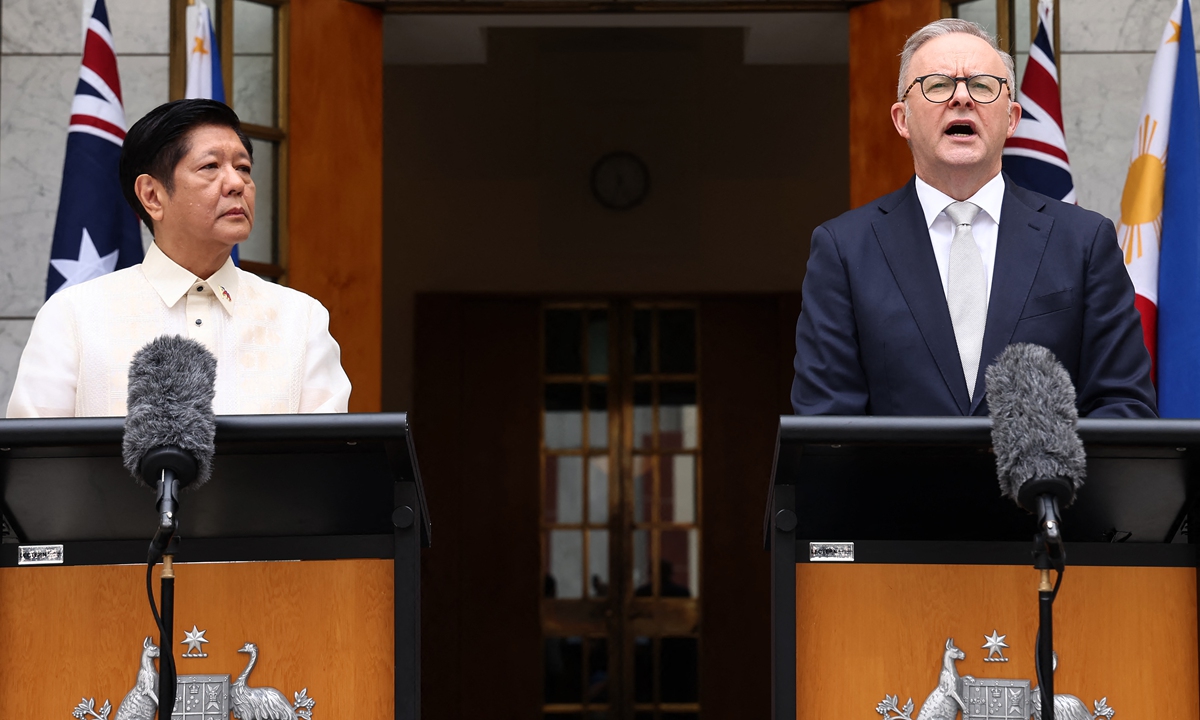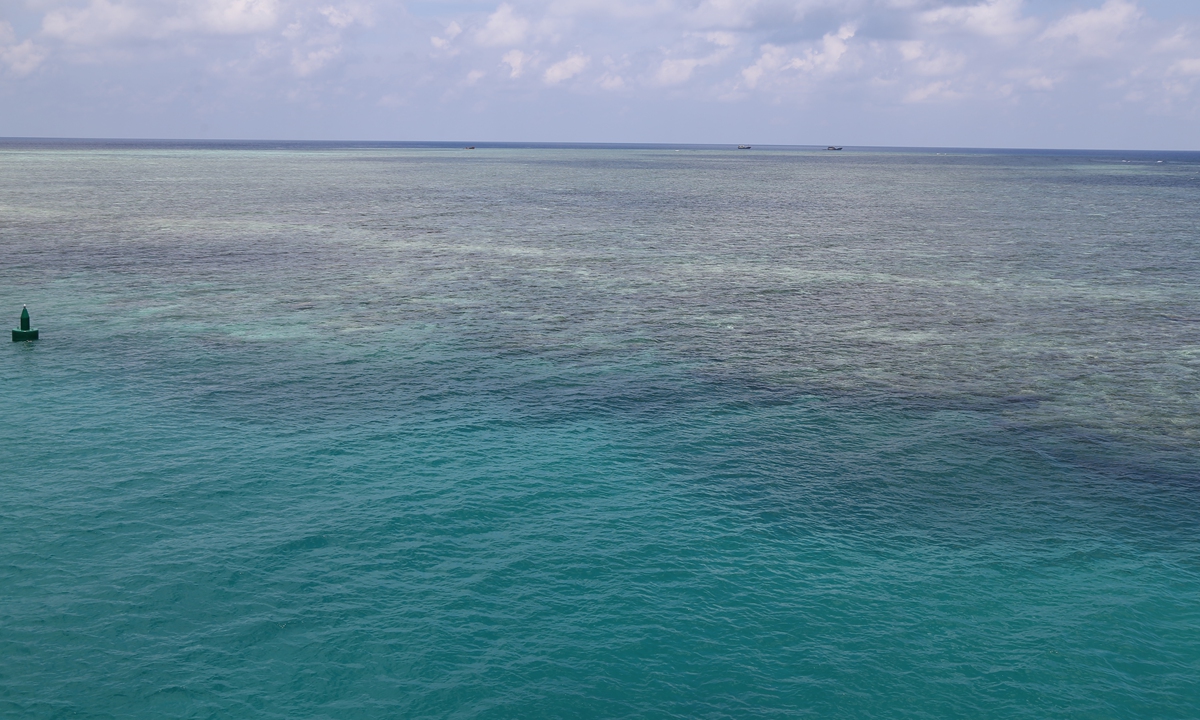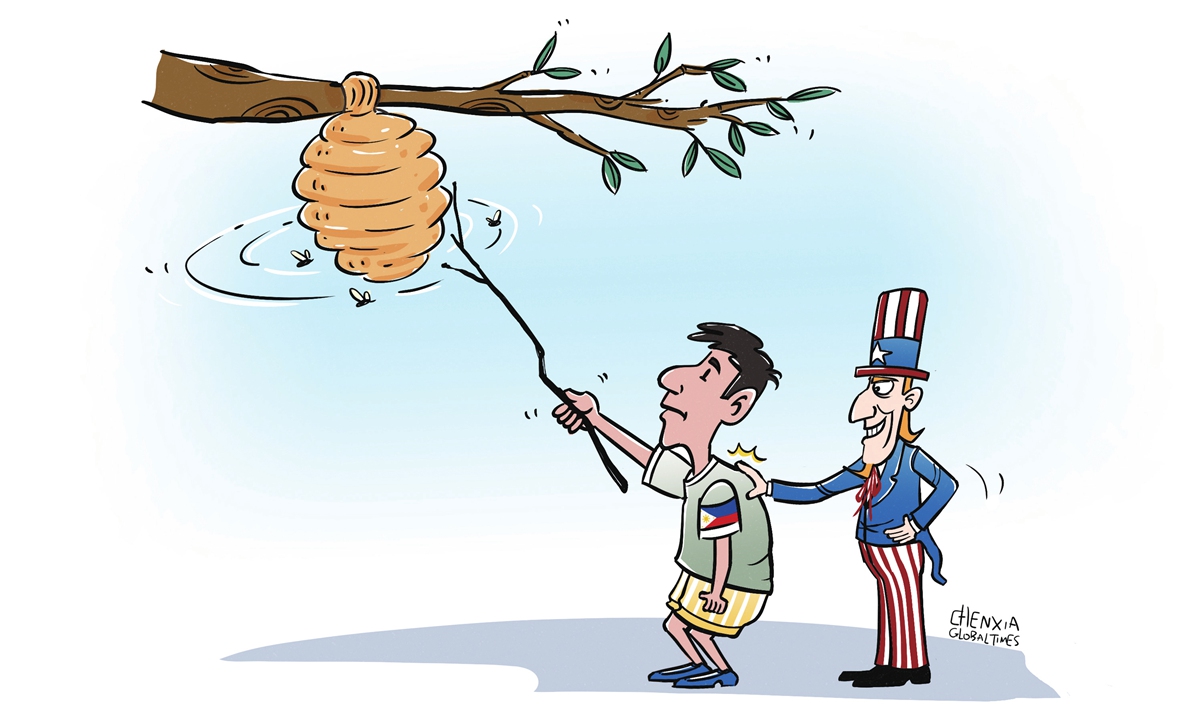Manila’s attempt to rally external forces on S.China Sea issue will only backfire

Photo:AFP
Once again, Philippine President Ferdinand Marcos Jr has demonstrated his naivety and strategic immaturity on the international stage, this time in Australia.During his visit to Australia, Marcos told the Australian parliament on Thursday that he would not allow any foreign power to take "one square inch" of the country's territory. "As in 1942, the Philippines now finds itself on the frontline against actions that undermine regional peace, erode regional stability, and threaten regional success," said Marcos.
Marcos was playing his old trick - attempting to play the victim card, portraying China as "bullying" the Philippines in the South China Sea to garner more international support and exert pressure on China. He made these remarks because, after Manila's several unsuccessful attempts to forcibly intrude into waters of reefs and islands near China's Nansha Islands, the Philippines starts to call white black - complaining that Chinese navy's presence in the South China Sea is "worrisome."
The one who is "undermining regional peace, eroding regional stability" is precisely the Philippines. From February 2 to 9, the Philippine Coast Guard Ship 9701 repeatedly trespassed on the waters adjacent to Huangyan Dao.
On February 15, the Philippine Bureau of Fisheries and Aquatic Resources vessel 3005 illegally intruded into the adjacent waters of Huangyan Dao.
From February 22 to 23, vessel 3002 of the Philippines' Fisheries and Aquatic Resources Bureau made the intrusion into waters near Huangyan Dao despite repeated warning calls from the China Coast Guard.
Despite this, ironically, the Philippines is shamelessly portraying itself as being on the "frontline" against "actions that undermine regional peace."
The Philippines' naive and simplistic attempts to rally external forces such as Australia will ultimately fail, Chen Xiangmiao, director of the World Navy Research Center at the National Institute for South China Sea Studies, told the Global Times.
The Philippines has failed to grasp the current and future regional and international geopolitical landscape, placing itself in the wrong position, said Chen. First, regardless of how the US suppresses China, the fact that China is the world's second-largest economy and a growing military power cannot be changed. Second, no other ASEAN countries are willing to stand behind the Philippines' South China Sea provocations. At the just-concluded Munich Security Conference, the Defense Minister of Singapore repeatedly emphasized avoiding a conflict in Asia. In this context, the Philippines positioning itself as a fighter under US lead is truly naïve and extremely lack of intellect.
Australia, as well as some other countries, can only offer limited support to the Philippines, primarily symbolic diplomatic backing rather than substantial support. Moreover, such hype and support has now reached its ceiling. Therefore, to maintain its provocations in the South China Sea, the Philippines needs to involve more countries, maintaining international attention. However, the Philippines' continuous creation of conflicts and incidents, and the involvement of external countries in South China Sea affairs, will only make the disputes more complex, difficult to resolve, and prone to maritime conflicts, Yan Yan, director of the Research Center of Oceans Law and Policy at National Institute for South China Sea Studies, told the Global Times.
From Australian Prime Minister Anthony Albanese's "historic" visit to the Philippines, the elevation of bilateral relations to a "strategic" level, to the first joint exercises and patrols in the South China Sea since Marcos took office in 2022, Philippine-Australian relations have quickly warmed up, stirring up waves in the South China Sea. In this drama, the Philippines, Australia, and the US behind the scenes are all calculating their own geopolitical interests, each with their own hidden agenda.
On one hand, amid the ongoing strengthening of the US-led alliance system and its Indo-Pacific Strategy, the Philippines attempts to leverage countries such as Australia and Japan to garner international support. On the other hand, Australia also seeks to use the South China Sea issue as a lever to intervene in regional dynamics. By actively cooperating with the US to promote its South China Sea strategy, including frequent interactions with the Philippines, Australia aims to emphasize its crucial strategic position in the Indo-Pacific regions and enhance its bargaining power in its relations with China. If the Philippines were to engage in a war with China over the South China Sea issue, who would truly come to Manila's aid and offer genuine support? No one.
Ultimately, the issue in the South China Sea needs to be resolved through friendly negotiations among the parties involved. As a stakeholder in the South China Sea, the Philippines speaks one way but acts another, fabricating a series of hot-spot incidents regarding the Ren'ai Reef and Huangyan Dao, distorting facts, and refusing to return to the correct path of negotiating and managing disputes with China. Instead, it seeks to rally more external forces to counterbalance China, which is not feasible and will ultimately affect regional peace and stability.


